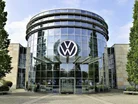How Cost and Demand Challenges are Impacting Volkswagen

Volkswagen (VW), a longstanding pillar of the German automotive industry, is making drastic cuts to address rising costs and stagnating demand.
The company has announced plans to close at least three factories in Germany, laying off thousands of workers and cutting wages by 10% for another 140,000 employees.
These actions mark a significant departure for the automaker, which has never previously shut down a factory on German soil in its 87-year history.
A critical need for restructuring
"We currently don't make enough money from our cars, while our costs for energy, materials and personnel have continued to rise," says Thomas Schäfer, CEO of Volkswagen Passenger Cars. "We cannot continue as before."
Thomas further explains that the company faces structural issues with costs that have risen sharply.
"Our factory costs are currently 25-50% above target. This means some of our German plants are twice as expensive as our competitors."
Volkswagen's restructuring plan, according to Thomas, is not merely a move to boost profit margins but a necessity to sustain the company's long-term viability in an increasingly-competitive market.
Overcapacity and rising operational costs
Volkswagen's German operations face significant challenges, particularly due to overcapacity.
According to VW, two of its factories are redundant, forcing the company to streamline production and improve efficiency.
With 10 factories and 300,000 employees across Germany, real-terms pay cuts could amount to 18% following a two-year wage freeze.
Daniela Cavallo, Chairperson at the General Works Council, voiced strong concerns, noting: "All German VW plants are affected by these plans. None is safe."
One plant particularly at risk is in Osnabrück, Lower Saxony, which recently lost a major contract with Porsche, VW's subsidiary. However, closing the plant could face political resistance as Lower Saxony's government is Volkswagen's second-largest shareholder, holding a 20% voting share.
Declining demand and EV transition hits VW
Volkswagen is grappling with declining demand in several leading markets, including China.
Rising interest rates and sluggish sales have weakened the company's position, leaving it vulnerable to the economic slowdown affecting many global automakers.
Chinese consumers, who once embraced VW's offerings, are now drawn to local and international competitors offering EVs at more affordable prices.
Meanwhile, Volkswagen has invested heavily in shifting from conventional combustion engines to EVs.
However, the transition has been difficult and expensive, with high production costs that Chinese EV makers largely avoid. In addition, slowing demand for EVs has made Volkswagen hesitant to invest in the large-scale production required to protect jobs.
The VW brand has struggled, particularly with its ID line of EVs underperforming due to initial software challenges and weak demand at home and abroad. Compounding the issue, other VW mass-market brands like Seat and Škoda produce comparable models that often come at lower prices, competing directly with the VW brand's offerings.
Impact of a stagnant European market and contracting economy
While Volkswagen holds a quarter of the European market share, the industry has shrunk by around two million vehicles annually since 2020.
"The sector was stagnating and will not recover in the foreseeable future," Volkswagen noted in a recent statement.
In Germany, broader economic challenges add further strain, with Europe's largest economy projected to contract for a second consecutive year in 2024.
VW's potential plant closures and job cuts could exacerbate Germany's industrial troubles, which have been intensified by high energy costs resulting from the end of cheap Russian natural gas supplies.
Daniela warns of potential industrial action if VW's management doesn't reconsider its plans: "The company is playing with the massive risk that everything will soon escalate here."
Volkswagen's tough road ahead
Volkswagen's restructuring marks a profound shift in the company's operational approach, reflecting the complex pressures of high costs, declining demand and competitive challenges in the EV market.
Sweeping changes highlight VW's challenges in transforming itself while contending with global economic uncertainties.
As Thomas puts it, VW is in a race for survival and these steps may only be the beginning of what's required to secure its future.
Make sure you check out the latest edition of EV Magazine and also sign up to our global conference series - Sustainability LIVE 2025.
EV Magazine is a BizClik brand.


